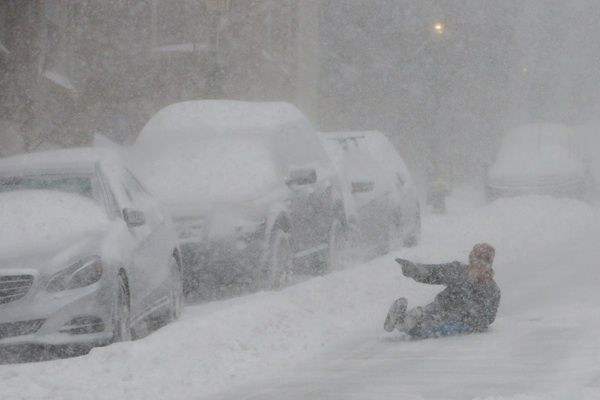Winter Storm Warning: 12 Must-Follow Ways To Prepare For Snow Weather
Winter storms can bring frigid air, ice and heavy snow across the country when they hit.
Aside from extremely low temperatures, winter storms also cause power failures, loss of communication services and slick, icy roads, making it difficult to stay safe and warm.
Here are some tips to keep yourself and your loved ones safe before and during a winter storm, according to the Centers for Disease Control and Prevention (CDC) and National Weather Service (NWS):
1. Discuss a plan with family members on what to do if a winter storm watch or warning is issued. This would lessen worry and anxiety, especially for the children.
2. Those who own vehicles should make sure that it is winterized before the winter storm season to decrease one's chances of being stranded in the cold weather. It is also highly advisable to keep the following in one's vehicle at all times during the winter season, per NWS:
- Mobile phone, charger, batteries
- Blankets/sleeping bags
- Flashlight with extra batteries
- First-aid kit
- Knife
- High-calorie, non-perishable food
- Extra clothing to keep dry
- Large empty can to use as emergency toilet, tissues, toilet paper and paper towels
- Small can and waterproof matches to melt snow for drinking water
- Sack of sand or cat litter for traction
- Shovel
- Windshield scraper and brush
- Tool kit
- Tow rope
- Battery booster cables
- Water container
- Candle and matches to provide light and in an emergency, lifesaving heat
- Compass and road maps, don't depend on mobile devices with limited battery life
3. Make sure your home is properly insulated. Caulk and weather-strip doors and windows, and repair roof leaks if there are any. It is also encouraged to cut away tree branches that could potentially fall on one's home during a storm. It is also advisable to keep the following in one's home or workplace in the event of a winter storm, per NWS:
- Flashlight and extra batteries
- Battery-powered NOAA Weather Radio and portable radio to receive emergency information
- Extra food and water such as dried fruit, nuts, granola bars and other food requiring no cooking or refrigeration.
- Extra prescription medicine
- Baby items such as diapers and formula
- First-aid supplies
- Heating fuel: refuel before you are empty; fuel carriers may not reach you for days after a winter storm
- Emergency heat source: fireplace, wood stove or space heater properly ventilated to prevent a fire
- Fire extinguisher
- Extra pet food and warm shelter for pets
4. Install a smoke detector and a battery-operated carbon monoxide detector. Make sure to test them monthly and replace their batteries twice a year. Keeping a multipurpose, dry-chemical fire extinguisher nearby is also advised.
5. During a winter storm, stay indoors and wear warm clothes. Keeping everyone in the family hydrated should also be observed. Drink liquids such as warm broth or juice, and avoid caffeine and alcohol as they accelerate the symptoms of hypothermia. Eating regularly is a must.
6. Conserve fuel. As most winter storms have a tendency to last for several days, electricity, gas, and other fuel distribution systems should not be wasted. The American Red Cross suggests that households should lower the thermostat to 65 degrees Fahrenheit (18 degrees Celsius) during the day and to 55 degrees Fahrenheit (13 degrees Celsius) at night.
7. Brush up knowledge on the signs and basic treatment for hypothermia and frostbite. Frostbite causes loss of feeling and color around the face, fingers and toes, and early signs include numbness and firm or waxy skin. Should a family member exhibit signs of frostbite, bring them to a warm room immediately and soak the specific body part in warm water. Do not use a heating pad or massage the body part.
8. For those who are or have a family member over 65 years old, keep an easy-to-read thermometer in an indoor location at all times. Human bodies become less sensitive to feeling temperature changes the more they age, and older people are more susceptible to health problems caused by the cold.
9. After a winter storm, check on animals or pets, if there are any, in the residence and ensure that they have a source of food and water.
10. Continue keeping track of any updates and listen to local news for the latest information and instructions.
11. Help those who require special assistance once the winter storm passes. Infants, elderly people and pregnant women are only a few of the many who might need help during an emergency situation.
12. Avoid overexertion. Heart attacks from shoveling heavy snow are common and are one of the leading causes of death during the winter.

© Copyright IBTimes 2025. All rights reserved.





















